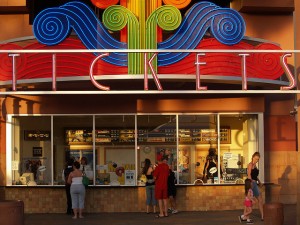Editors’ Note: This article is part of the Patheos Public Square. This month we’re asking: Has Hollywood Become Our National Conscience? Read other perspectives here.
When I watch a movie or TV show, I want to be entertained by a good story, not pummeled by an overbearing message. At the same time, a story that’s well-told can seamlessly integrate a message that draws me in, and leaves me thinking about real-life issues.
That’s because stories don’t so much tell us what to believe or do; they show us the results of believing or acting a certain way, then leave us to ponder how that applies to our own lives.
At The Christophers, the Catholic media ministry where I work, we’ve been recognizing books, television programs and movies that tell those kinds of stories since 1949 through our Christopher Awards program. And looking back at some of our recent film winners, social justice themes are often present.
Take racism, for example. “42” tells the story of Jackie Robinson breaking the color barrier in baseball when he was hired by the Brooklyn Dodgers. There’s a scene in which Philadelphia Phillies manager Ben Chapman (Alan Tudyk) berates Robinson (Chadwick Boseman) with racial epithets during a game.
For 21st century viewers who don’t understand what African Americans endured in the 1940s, this scene doesn’t provide dry history; it immerses you in that particular time and makes you identify with Robinson. It’s conveying a social justice message by letting you witness the verbal violence, hatred and pure ignorance of racism first hand.
The same can be said about “Selma,” a Christopher Award winner about African Americans peacefully protesting to secure their voting rights in 1965. Actor David Oyelowo, who played Rev. Martin Luther King Jr., relished his role because he knows movies have an impact on the wider culture. In fact, he once traveled to Africa and was surprised to find that even in poor villages, children sometimes have access to a computer screen and are influenced by American TV and movies.
When I interviewed Oyelowo, he said, “I have a moral compass that is very much shaped by my faith, but also by being a father and a socially responsible citizen. I’ve seen films I’ve been involved with have a huge impact on culture. ‘Selma,’ for instance. That film being released at a time when there’s been so much racial tension in this country, I’ve seen it bring hope to people [and] bring an example of how to overcome some of these situations. I’ve seen it also educate people about how things were done in the past – and maybe how things can be done now and in the future…I want to continue using whatever platform I have to bring a degree of positivity to the world around me.”
That desire to bring a positive message to the world also motivated Patricia Heaton, an actress known for “Everybody Loves Raymond” and “The Middle,” to take on a producing role for the 2006 Christopher Award winner “Amazing Grace.” It told the story of William Wilberforce, who helped end the slave trade in England during the 1800s.
Not only was this a tale about social justice, but also about faith. Heaton told me, “Wilberforce’s faith is what propelled him to take on this huge commitment – and the fact that he was able to apply his faith to a social problem was very important. Probably the only thing that was able to keep him going was his faith because it literally took 40 years…Wilberforce was shunned from society. He used to be a bon vivant, and then essentially was disinvited to be with the ‘cool’ people and had to hang out with all the Christian abolitionists…There’s a price to pay, and I think that is one of the messages: you have to be willing to sacrifice everything to follow God and what He’s called you to do.”
That relation between social justice and religious faith can’t be overlooked. Consider this exchange from “42” between baseball executive Branch Rickey, who hired Robinson, and an opposing player:
Branch Rickey: You think God likes baseball, Herb?
Herb Pennock: What – ? What the hell is that supposed to mean?
Branch Rickey: It means someday you’re gonna meet God, and when he inquires as to why you didn’t take the field against Robinson in Philadelphia, and you answer that it’s because he was a Negro, it may not be a sufficient reply!
Martin Luther King Jr., of course, was a reverend and attracted many religious believers of all faiths to the civil rights movement. And Wilberforce saw the truth that God created all human beings in His image as a motivating force behind the abolitionist movement.
None of these movies share their messages in a preachy way; they allow the story to speak for itself. In so doing, I believe they plant seeds in our minds that can make us a more just people who create a more just world.
(Photo credit: bossco via Visual Hunt / CC BY-SA. Photo credit: bossco via Visual Hunt / CC BY-SA)
Stay in touch! Like The Christophers on Facebook:













